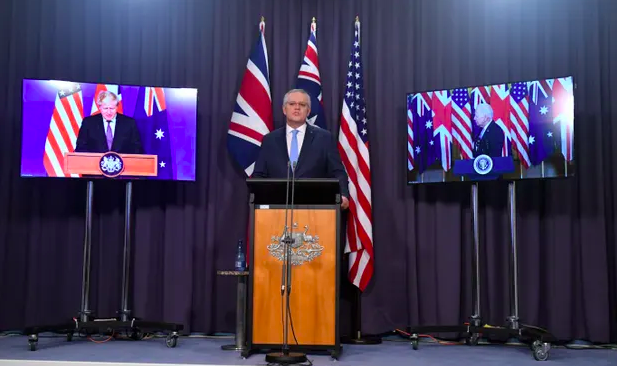This article was originally published by SAGE International, on September 17, 2021. Thank you to the author for his kind permission to re-publish.
On September 16, the Morrison government took a huge step in countering the threat posed by the People’s Republic of China. The AUKUS, or, Australia, the UK and US security agreement was publicly announced. Phase one of this ambitious new agreement was to scrap the troubled AUD90 billion French submarine contract. Without going into too much detail about this, Australian negotiators were deeply unhappy about how the French were unwilling to move on issues considered high priority by the Australians regarding the Shortfin Barracuda contract. The Americans were unhappy that the RAN’s Submarine 2015 Competitive Evaluation Process (CEP) didn’t choose the Japanese design since any Australian boat would have to integrate American technology which meant that from an alliance perspective, the Japanese hull would have been a far better fit for ANZUS Indo-Pacific contingencies.
Of course, at the time of choosing the submarine design for Australia, the French lobbied hard to gain the lucrative contract, Japanese defence export inexperience prevented them from mounting an equally compelling case, except towards the very end by which stage it was too late while the German global generic submarine design gained little traction within Navy. Now, five years and AUD2.4 billion spent on the ill-fated Shortfin Barracuda design, the contract has been scrapped and replaced by a far more ambitious project – to build a class of nuclear-powered submarines for the Royal Australian Navy, something that a faction within the RAN have always wanted but would never have thought possible because Australia’s political class and constituency are largely ‘anti-nuclear.’ There might be a political price that Prime Minister Morrison will have to pay for taking such bold action but considering the sad situation within the Opposition Labour Party, it is unlikely that they are strong enough to break bipartisanship on matters of security.
On the jobs front, Morrison declared that Adelaide would be building the new fleet of submarines, thereby retaining the city’s submarine construction capability. But there was a fly in the ointment. An 18-month AUKUS process regarding the new submarine project will be conducted. By the end of this process there is no guarantee that what was announced on 16th September 2021 will be what will happen. Indeed, the scale of the project might be cut from 12 boats to 8. Furthermore, Adelaide might not be able to secure the assembly of all boats with perhaps as many as two being constructed in overseas shipbuilding yards. This wouldn’t be surprising considering Australia’s lack of experience in building nuclear-powered submarines which are technically more complex vessels than diesel-electric boats.
Then there’s the diplomatic fallout
The French have expressed their anger at Canberra in dropping the Shortfin Barracuda contract. This anger stems from the fact that for the Macron government, the Shortfin Barracuda was a centrepiece of French engagement with the Indo-Pacific. A successful sale of submarines to Australia might well have meant future lucrative Indo-Pacific contracts. Morrison’s announcement has dealt a significant blow to Paris, and it will be a while before Australia’s relationship with France will find a new positive equilibrium. Arguably for the short to medium term, Canberra’s relationship with Paris will be sour and tense. And to be sure some French criticism was warranted. The ‘surprising’ nature of the AUKUS announcement was designed to catch people off guard and from the French perspective, it looked very much like a diplomatic ambush. As statecraft is not a strong suit of Australia, it is true that the announcement could have been done in a more respectful way to limit the diplomatic damage to Paris. But then again, an argument could be made that through this, the UK exacted its revenge for having been asked to withdraw from the European Galileo satellite navigation system after it had invested over AUD1 billion in that project.
Then there was the expected furor AUKUS and Australia choosing a nuclear-powered submarine would have in the corridors of power in Beijing
Chairman Xi Jinping and the CCP are displeased. Australia hardening its cooperative security arrangements with the UK and US, seen from a zero-sum perspective, can only be interpreted by the PRC as an ‘unfriendly act.’ But Xi and the CCP have possibly forgotten their own hand in creating the current strategic environment with their Wolf Warrior diplomacy. Australia is now a front-line state in the broader international strategic competition between the US and the People’s Republic. Having been significantly disrupted by Chinese cyber actions in June of 2020 and having suffered from the cold dead hand of totalitarian rhetoric and economic sanctions, not to mention the forays of Chinese political interference in Australia, a very strong case can be made that the CCP ‘unfriended’ Australia first and that Canberra wanted to ‘return the favour’.
Will buying nuclear powered submarines make Australia more of a military target? Not in the short or medium term
The PRC’s military is still not the same type of global threat as that posed by the Soviet Union during the Cold War. To be sure Australia, hosting some critical US facilities in support of the American global military and intelligence gathering satellite network will always have been an attractive target for an occasional ballistic missile, nuclear or conventionally tipped. But this only works when two powers have ballistic missile and or nuclear parity. Presently, the Chinese ICBM fleet does not have parity with the US and therefore would not have spare capacity for ‘Australian’ contingencies especially since these expensive and complex intercontinental missiles would be primarily if not exclusively used to deter an American attack. Furthermore, America’s ‘extended deterrence’ to Australia, implied though not guaranteed under ANZUS, cannot prevent a US counterforce strike against similar PRC installations by American ICBMs, especially if American civilians or service personnel were killed or injured in a Chinese missile strike. Furthermore, should such a strike occur on Australian soil the likelihood of any Australian government forgiving the Chinese is highly unlikely, leading to all kinds of serious unpleasantries.
In the end from a strategic perspective Morrison signing on to the AUKUS makes sense. Australia has feared isolation and abandonment since the beginning of white settlement. It is therefore in Australia’s nature to reach out to friendly great and powerful states for them to feel invested in Australia’s security.
Timing is everything
Brexit and the ambitions of the Johnson government to find a path back to global relevance has changed the UK’s security equation and made it far more conducive to seeking out new security arrangements. The Biden administration is picking up where former President Obama couldn’t make headway on America pivoting to Asia. Ironically, this was a Trump legacy of sorts though probably more by accident than design. As for France, it has significant overseas territories in the Indian and Pacific Oceans. It will continue courting India and Vietnam and at some stage in the not-too-distant future a natural disaster in one of the French overseas dependencies will see Franco-Australian cooperation resume on friendlier terms.
But AUKUS’ birth has been a disruptive event
To land a punch on the Wolf Warrior’s jaw, Morrison torpedoed the Shortfin Barracuda contract and scuppered Franco-Australian relations in the short term. Regarding the new submarines, there will be a lot of media speculation whether the new submarines for the RAN will be a UK or a US hull, whether Australia will get 12 or 8 boats and whether all those boats will be built from Adelaide. While idle speculation is fun, the facts once they come out 18 months from now may tell a different story from the September 16 political announcement.
Picture credits: Mick Tsikas/EPA – The Guardian






Be First to Comment